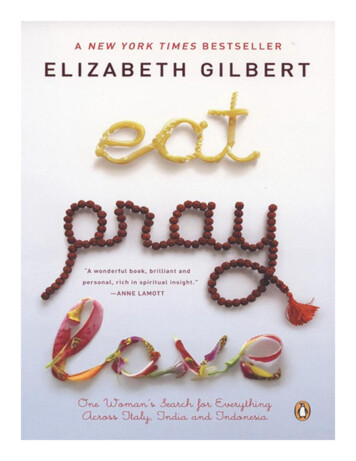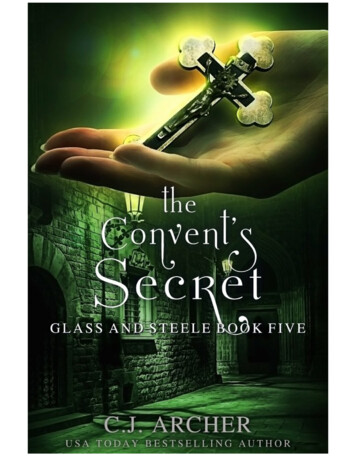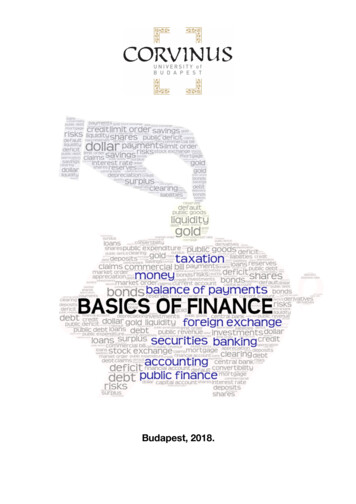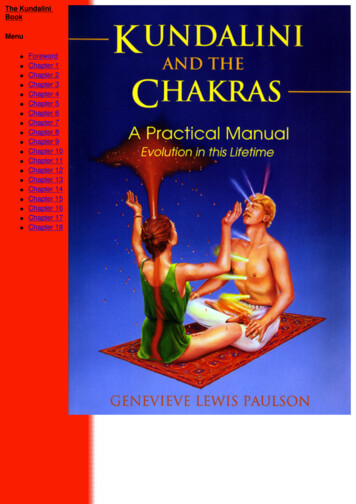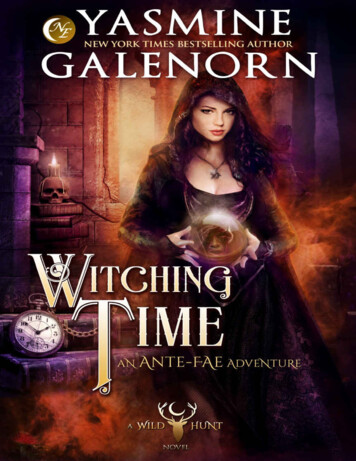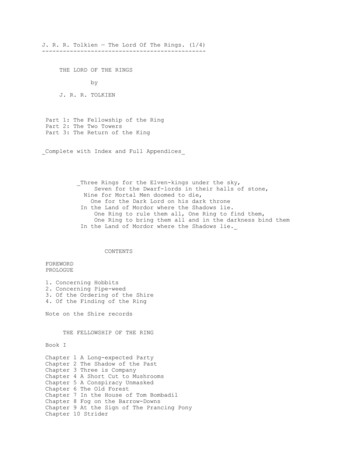
Transcription
and you see it through no matter what. You rarely win, but sometimes you do.Mrs. Dubose won, all ninety-eight pounds of her. According to her views, shedied beholden to nothing and nobody. She was the bravest person I ever knew.”Jem picked up the candy box and threw it in the fire. He picked up the camellia,and when I went off to bed I saw him fingering the wide petals. Atticus wasreading the paper.PART TWOContents - Prev / NextChapter 12Jem was twelve. He was difficult to live with, inconsistent, moody. His appetitewas appalling, and he told me so many times to stop pestering him I consultedAtticus: “Reckon he’s got a tapeworm?” Atticus said no, Jem was growing. I mustbe patient with him and disturb him as little as possible.This change in Jem had come about in a matter of weeks. Mrs. Dubose was notcold in her grave—Jem had seemed grateful enough for my company when hewent to read to her. Overnight, it seemed, Jem had acquired an alien set of valuesand was trying to impose them on me: several times he went so far as to tell mewhat to do. After one altercation when Jem hollered, “It’s time you started bein‘ agirl and acting right!” I burst into tears and fled to Calpurnia.“Don’t you fret too much over Mister Jem—” she began.“Mister Jem?”“Yeah, he’s just about Mister Jem now.”“He ain’t that old,” I said. “All he needs is somebody to beat him up, and I ain’tbig enough.”“Baby,” said Calpurnia, “I just can’t help it if Mister Jem’s growin‘ up. He’s
gonna want to be off to himself a lot now, doin’ whatever boys do, so you justcome right on in the kitchen when you feel lonesome. We’ll find lots of things todo in here.”The beginning of that summer boded well: Jem could do as he pleased; Calpurniawould do until Dill came. She seemed glad to see me when I appeared in thekitchen, and by watching her I began to think there was some skill involved inbeing a girl.But summer came and Dill was not there. I received a letter and a snapshot fromhim. The letter said he had a new father whose picture was enclosed, and hewould have to stay in Meridian because they planned to build a fishing boat. Hisfather was a lawyer like Atticus, only much younger. Dill’s new father had apleasant face, which made me glad Dill had captured him, but I was crushed. Dillconcluded by saying he would love me forever and not to worry, he would comeget me and marry me as soon as he got enough money together, so please write.The fact that I had a permanent fiancé was little compensation for his absence: Ihad never thought about it, but summer was Dill by the fishpool smoking string,Dill’s eyes alive with complicated plans to make Boo Radley emerge; summerwas the swiftness with which Dill would reach up and kiss me when Jem was notlooking, the longings we sometimes felt each other feel. With him, life wasroutine; without him, life was unbearable. I stayed miserable for two days.As if that were not enough, the state legislature was called into emergency sessionand Atticus left us for two weeks. The Governor was eager to scrape a fewbarnacles off the ship of state; there were sit-down strikes in Birmingham; breadlines in the cities grew longer, people in the country grew poorer. But these wereevents remote from the world of Jem and me.We were surprised one morning to see a cartoon in the Montgomery Advertiserabove the caption, “Maycomb’s Finch.” It showed Atticus barefooted and in shortpants, chained to a desk: he was diligently writing on a slate while some frivolouslooking girls yelled, “Yoo-hoo!” at him.“That’s a compliment,” explained Jem. “He spends his time doin‘ things thatwouldn’t get done if nobody did ’em.”“Huh?”
In addition to Jem’s newly developed characteristics, he had acquired amaddening air of wisdom.“Oh, Scout, it’s like reorganizing the tax systems of the counties and things. Thatkind of thing’s pretty dry to most men.”“How do you know?”“Oh, go on and leave me alone. I’m readin‘ the paper.”Jem got his wish. I departed for the kitchen.While she was shelling peas, Calpurnia suddenly said, “What am I gonna doabout you all’s church this Sunday?”“Nothing, I reckon. Atticus left us collection.”Calpurnia’s eyes narrowed and I could tell what was going through her mind.“Cal,” I said, “you know we’ll behave. We haven’t done anything in church inyears.”Calpurnia evidently remembered a rainy Sunday when we were both fatherlessand teacherless. Left to its own devices, the class tied Eunice Ann Simpson to achair and placed her in the furnace room. We forgot her, trooped upstairs tochurch, and were listening quietly to the sermon when a dreadful banging issuedfrom the radiator pipes, persisting until someone investigated and brought forthEunice Ann saying she didn’t want to play Shadrach any more—Jem Finch saidshe wouldn’t get burnt if she had enough faith, but it was hot down there.“Besides, Cal, this isn’t the first time Atticus has left us,” I protested.“Yeah, but he makes certain your teacher’s gonna be there. I didn’t hear him saythis time—reckon he forgot it.” Calpurnia scratched her head. Suddenly shesmiled. “How’d you and Mister Jem like to come to church with me tomorrow?”“Really?”“How ‘bout it?” grinned Calpurnia.If Calpurnia had ever bathed me roughly before, it was nothing compared to hersupervision of that Saturday night’s routine. She made me soap all over twice,drew fresh water in the tub for each rinse; she stuck my head in the basin andwashed it with Octagon soap and castile. She had trusted Jem for years, but that
night she invaded his privacy and provoked an outburst: “Can’t anybody take abath in this house without the whole family lookin‘?”Next morning she began earlier than usual, to “go over our clothes.” WhenCalpurnia stayed overnight with us she slept on a folding cot in the kitchen; thatmorning it was covered with our Sunday habiliments. She had put so much starchin my dress it came up like a tent when I sat down. She made me wear a petticoatand she wrapped a pink sash tightly around my waist. She went over my patentleather shoes with a cold biscuit until she saw her face in them.“It’s like we were goin‘ to Mardi Gras,” said Jem. “What’s all this for, Cal?”“I don’t want anybody sayin‘ I don’t look after my children,” she muttered.“Mister Jem, you absolutely can’t wear that tie with that suit. It’s green.”“‘smatter with that?”“Suit’s blue. Can’t you tell?”“Hee hee,” I howled, “Jem’s color blind.”His face flushed angrily, but Calpurnia said, “Now you all quit that. You’re gonnago to First Purchase with smiles on your faces.”First Purchase African M.E. Church was in the Quarters outside the southerntown limits, across the old sawmill tracks. It was an ancient paint-peeled framebuilding, the only church in Maycomb with a steeple and bell, called FirstPurchase because it was paid for from the first earnings of freed slaves. Negroesworshiped in it on Sundays and white men gambled in it on weekdays.The churchyard was brick-hard clay, as was the cemetery beside it. If someonedied during a dry spell, the body was covered with chunks of ice until rainsoftened the earth. A few graves in the cemetery were marked with crumblingtombstones; newer ones were outlined with brightly colored glass and brokenCoca-Cola bottles. Lightning rods guarding some graves denoted dead who resteduneasily; stumps of burned-out candles stood at the heads of infant graves. It wasa happy cemetery.The warm bittersweet smell of clean Negro welcomed us as we entered thechurchyard—Hearts of Love hairdressing mingled with asafoetida, snuff, Hoyt’sCologne, Brown’s Mule, peppermint, and lilac talcum.
When they saw Jem and me with Calpurnia, the men stepped back and took offtheir hats; the women crossed their arms at their waists, weekday gestures ofrespectful attention. They parted and made a small pathway to the church door forus. Calpurnia walked between Jem and me, responding to the greetings of herbrightly clad neighbors.“What you up to, Miss Cal?” said a voice behind us.Calpurnia’s hands went to our shoulders and we stopped and looked around:standing in the path behind us was a tall Negro woman. Her weight was on oneleg; she rested her left elbow in the curve of her hip, pointing at us with upturnedpalm. She was bullet-headed with strange almond-shaped eyes, straight nose, andan Indian-bow mouth. She seemed seven feet high.I felt Calpurnia’s hand dig into my shoulder. “What you want, Lula?” she asked,in tones I had never heard her use. She spoke quietly, contemptuously.“I wants to know why you bringin‘ white chillun to nigger church.”“They’s my comp’ny,” said Calpurnia. Again I thought her voice strange: she wastalking like the rest of them.“Yeah, an‘ I reckon you’s comp’ny at the Finch house durin’ the week.”A murmur ran through the crowd. “Don’t you fret,” Calpurnia whispered to me,but the roses on her hat trembled indignantly.When Lula came up the pathway toward us Calpurnia said, “Stop right there,nigger.”Lula stopped, but she said, “You ain’t got no business bringin‘ white chillun here—they got their church, we got our’n. It is our church, ain’t it, Miss Cal?”Calpurnia said, “It’s the same God, ain’t it?”Jem said, “Let’s go home, Cal, they don’t want us here—”I agreed: they did not want us here. I sensed, rather than saw, that we were beingadvanced upon. They seemed to be drawing closer to us, but when I looked up atCalpurnia there was amusement in her eyes. When I looked down the pathwayagain, Lula was gone. In her place was a solid mass of colored people.One of them stepped from the crowd. It was Zeebo, the garbage collector. “MisterJem,” he said, “we’re mighty glad to have you all here. Don’t pay no ‘tention to
Lula, she’s contentious because Reverend Sykes threatened to church her. She’s atroublemaker from way back, got fancy ideas an’ haughty ways—we’re mightyglad to have you all.”With that, Calpurnia led us to the church door where we were greeted byReverend Sykes, who led us to the front pew.First Purchase was unceiled and unpainted within. Along its walls unlightedkerosene lamps hung on brass brackets; pine benches served as pews. Behind therough oak pulpit a faded pink silk banner proclaimed God Is Love, the church’sonly decoration except a rotogravure print of Hunt’s The Light of the World.There was no sign of piano, organ, hymn-books, church programs—the familiarecclesiastical impedimenta we saw every Sunday. It was dim inside, with a dampcoolness slowly dispelled by the gathering congregation. At each seat was a cheapcardboard fan bearing a garish Garden of Gethsemane, courtesy Tyndal’sHardware Co. (You-Name-It-We-Sell-It).Calpurnia motioned Jem and me to the end of the row and placed herself betweenus. She fished in her purse, drew out her handkerchief, and untied the hard wad ofchange in its corner. She gave a dime to me and a dime to Jem. “We’ve got ours,”he whispered. “You keep it,” Calpurnia said, “you’re my company.” Jem’s faceshowed brief indecision on the ethics of withholding his own dime, but his innatecourtesy won and he shifted his dime to his pocket. I did likewise with no qualms.“Cal,” I whispered, “where are the hymn-books?”“We don’t have any,” she said.“Well how—?”“Sh-h,” she said. Reverend Sykes was standing behind the pulpit staring thecongregation to silence. He was a short, stocky man in a black suit, black tie,white shirt, and a gold watch-chain that glinted in the light from the frostedwindows.He said, “Brethren and sisters, we are particularly glad to have company with usthis morning. Mister and Miss Finch. You all know their father. Before I begin Iwill read some announcements.”Reverend Sykes shuffled some papers, chose one and held it at arm’s length. “The
Missionary Society meets in the home of Sister Annette Reeves next Tuesday.Bring your sewing.”He read from another paper. “You all know of Brother Tom Robinson’s trouble.He has been a faithful member of First Purchase since he was a boy. Thecollection taken up today and for the next three Sundays will go to Helen—hiswife, to help her out at home.”I punched Jem. “That’s the Tom Atticus’s de—”“Sh-h!”I turned to Calpurnia but was hushed before I opened my mouth. Subdued, I fixedmy attention upon Reverend Sykes, who seemed to be waiting for me to settledown. “Will the music superintendent lead us in the first hymn,” he said.Zeebo rose from his pew and walked down the center aisle, stopping in front of usand facing the congregation. He was carrying a battered hymn-book. He opened itand said, “We’ll sing number two seventy-three.”This was too much for me. “How’re we gonna sing it if there ain’t any hymnbooks?”Calpurnia smiled. “Hush baby,” she whispered, “you’ll see in a minute.”Zeebo cleared his throat and read in a voice like the rumble of distant artillery:“There’s a land beyond the river.”Miraculously on pitch, a hundred voices sang out Zeebo’s words. The lastsyllable, held to a husky hum, was followed by Zeebo saying, “That we call thesweet forever.”Music again swelled around us; the last note lingered and Zeebo met it with thenext line: “And we only reach that shore by faith’s decree.”The congregation hesitated, Zeebo repeated the line carefully, and it was sung. Atthe chorus Zeebo closed the book, a signal for the congregation to proceedwithout his help.On the dying notes of “Jubilee,” Zeebo said, “In that far-off sweet forever, justbeyond the shining river.”Line for line, voices followed in simple harmony until the hymn ended in a
melancholy murmur.I looked at Jem, who was looking at Zeebo from the corners of his eyes. I didn’tbelieve it either, but we had both heard it.Reverend Sykes then called on the Lord to bless the sick and the suffering, aprocedure no different from our church practice, except Reverend Sykes directedthe Deity’s attention to several specific cases.His sermon was a forthright denunciation of sin, an austere declaration of themotto on the wall behind him: he warned his flock against the evils of headybrews, gambling, and strange women. Bootleggers caused enough trouble in theQuarters, but women were worse. Again, as I had often met it in my own church,I was confronted with the Impurity of Women doctrine that seemed to preoccupyall clergymen.Jem and I had heard the same sermon Sunday after Sunday, with only oneexception. Reverend Sykes used his pulpit more freely to express his views onindividual lapses from grace: Jim Hardy had been absent from church for fiveSundays and he wasn’t sick; Constance Jackson had better watch her ways—shewas in grave danger for quarreling with her neighbors; she had erected the onlyspite fence in the history of the Quarters.Reverend Sykes closed his sermon. He stood beside a table in front of the pulpitand requested the morning offering, a proceeding that was strange to Jem and me.One by one, the congregation came forward and dropped nickels and dimes into ablack enameled coffee can. Jem and I followed suit, and received a soft, “Thankyou, thank you,” as our dimes clinked.To our amazement, Reverend Sykes emptied the can onto the table and raked thecoins into his hand. He straightened up and said, “This is not enough, we musthave ten dollars.”The congregation stirred. “You all know what it’s for—Helen can’t leave thosechildren to work while Tom’s in jail. If everybody gives one more dime, we’llhave it—” Reverend Sykes waved his hand and called to someone in the back ofthe church. “Alec, shut the doors. Nobody leaves here till we have ten dollars.”Calpurnia scratched in her handbag and brought forth a battered leather coinpurse. “Naw Cal,” Jem whispered, when she handed him a shiny quarter, “we can
put ours in. Gimme your dime, Scout.”The church was becoming stuffy, and it occurred to me that Reverend Sykesintended to sweat the amount due out of his flock. Fans crackled, feet shuffled,tobacco-chewers were in agony.Reverend Sykes startled me by saying sternly, “Carlow Richardson, I haven’tseen you up this aisle yet.”A thin man in khaki pants came up the aisle and deposited a coin. Thecongregation murmured approval.Reverend Sykes then said, “I want all of you with no children to make a sacrificeand give one more dime apiece. Then we’ll have it.”Slowly, painfully, the ten dollars was collected. The door was opened, and thegust of warm air revived us. Zeebo lined On Jordan’s Stormy Banks, and churchwas over.I wanted to stay and explore, but Calpurnia propelled me up the aisle ahead ofher. At the church door, while she paused to talk with Zeebo and his family, Jemand I chatted with Reverend Sykes. I was bursting with questions, but decided Iwould wait and let Calpurnia answer them.“We were ‘specially glad to have you all here,” said Reverend Sykes. “Thischurch has no better friend than your daddy.”My curiosity burst: “Why were you all takin‘ up collection for Tom Robinson’swife?”“Didn’t you hear why?” asked Reverend Sykes. “Helen’s got three little’uns andshe can’t go out to work—”“Why can’t she take ‘em with her, Reverend?” I asked. It was customary for fieldNegroes with tiny children to deposit them in whatever shade there was whiletheir parents worked—usually the babies sat in the shade between two rows ofcotton. Those unable to sit were strapped papoose-style on their mothers’ backs,or resided in extra cotton bags.Reverend Sykes hesitated. “To tell you the truth, Miss Jean Louise, Helen’sfinding it hard to get work these days when it’s picking time, I think Mr. LinkDeas’ll take her.”
“Why not, Reverend?”Before he could answer, I felt Calpurnia’s hand on my shoulder. At its pressure Isaid, “We thank you for lettin‘ us come.” Jem echoed me, and we made our wayhomeward.“Cal, I know Tom Robinson’s in jail an‘ he’s done somethin’ awful, but whywon’t folks hire Helen?” I asked.Calpurnia, in her navy voile dress and tub of a hat, walked between Jem and me.“It’s because of what folks say Tom’s done,” she said. “Folks aren’t anxious to—to have anything to do with any of his family.”“Just what did he do, Cal?”Calpurnia sighed. “Old Mr. Bob Ewell accused him of rapin‘ his girl an’ had himarrested an‘ put in jail—”“Mr. Ewell?” My memory stirred. “Does he have anything to do with thoseEwells that come every first day of school an‘ then go home? Why, Atticus saidthey were absolute trash—I never heard Atticus talk about folks the way he talkedabout the Ewells. He said-”“Yeah, those are the ones.”“Well, if everybody in Maycomb knows what kind of folks the Ewells are they’dbe glad to hire Helen what’s rape, Cal?”“It’s somethin‘ you’ll have to ask Mr. Finch about,” she said. “He can explain itbetter than I can. You all hungry? The Reverend took a long time unwindin’ thismorning, he’s not usually so tedious.”“He’s just like our preacher,” said Jem, “but why do you all sing hymns thatway?”“Linin‘?” she asked.“Is that what it is?”“Yeah, it’s called linin‘. They’ve done it that way as long as I can remember.”Jem said it looked like they could save the collection money for a year and getsome hymn-books.Calpurnia laughed. “Wouldn’t do any good,” she said. “They can’t read.”
“Can’t read?” I asked. “All those folks?”“That’s right,” Calpurnia nodded. “Can’t but about four folks in First Purchaseread I’m one of ‘em.”“Where’d you go to school, Cal?” asked Jem.“Nowhere. Let’s see now, who taught me my letters? It was Miss MaudieAtkinson’s aunt, old Miss Buford—”“Are you that old?”“I’m older than Mr. Finch, even.” Calpurnia grinned. “Not sure how much,though. We started rememberin‘ one time, trying to figure out how old I was—Ican remember back just a few years more’n he can, so I’m not much older, whenyou take off the fact that men can’t remember as well as women.”“What’s your birthday, Cal?”“I just have it on Christmas, it’s easier to remember that way—I don’t have a realbirthday.”“But Cal,” Jem protested, “you don’t look even near as old as Atticus.”“Colored folks don’t show their ages so fast,” she said.“Maybe because they can’t read. Cal, did you teach Zeebo?”“Yeah, Mister Jem. There wasn’t a school even when he was a boy. I made himlearn, though.”Zeebo was Calpurnia’s eldest son. If I had ever thought about it, I would haveknown that Calpurnia was of mature years—Zeebo had half-grown children—butthen I had never thought about it.“Did you teach him out of a primer, like us?” I asked.“No, I made him get a page of the Bible every day, and there was a book MissBuford taught me out of—bet you don’t know where I got it,” she said.We didn’t know.Calpurnia said, “Your Granddaddy Finch gave it to me.”“Were you from the Landing?” Jem asked. “You never told us that.”“I certainly am, Mister Jem. Grew up down there between the Buford Place andthe Landin‘. I’ve spent all my days workin’ for the Finches or the Bufords, an‘ I
moved to Maycomb when your daddy and your mamma married.”“What was the book, Cal?” I asked.“Blackstone’s Commentaries.”Jem was thunderstruck. “You mean you taught Zeebo outa that?”“Why yes sir, Mister Jem.” Calpurnia timidly put her fingers to her mouth. “Theywere the only books I had. Your grandaddy said Mr. Blackstone wrote fineEnglish—”“That’s why you don’t talk like the rest of ‘em,” said Jem.“The rest of who?”“Rest of the colored folks. Cal, but you talked like they did in church ”That Calpurnia led a modest double life never dawned on me. The idea that shehad a separate existence outside our household was a novel one, to say nothing ofher having command of two languages. “Cal,” I asked, “why do you talk niggertalk to the—to your folks when you know it’s not right?”“Well, in the first place I’m black—”“That doesn’t mean you hafta talk that way when you know better,” said Jem.Calpurnia tilted her hat and scratched her head, then pressed her hat downcarefully over her ears. “It’s right hard to say,” she said. “Suppose you and Scouttalked colored-folks’ talk at home it’d be out of place, wouldn’t it? Now what if Italked white-folks’ talk at church, and with my neighbors? They’d think I wasputtin‘ on airs to beat Moses.”“But Cal, you know better,” I said.“It’s not necessary to tell all you know. It’s not ladylike—in the second place,folks don’t like to have somebody around knowin‘ more than they do. Itaggravates ’em. You’re not gonna change any of them by talkin‘ right, they’vegot to want to learn themselves, and when they don’t want to learn there’s nothingyou can do but keep your mouth shut or talk their language.”“Cal, can I come to see you sometimes?”She looked down at me. “See me, honey? You see me every day.”“Out to your house,” I said. “Sometimes after work? Atticus can get me.”
“Any time you want to,” she said. “We’d be glad to have you.”We were on the sidewalk by the Radley Place.“Look on the porch yonder,” Jem said.I looked over to the Radley Place, expecting to see its phantom occupant sunninghimself in the swing. The swing was empty.“I mean our porch,” said Jem.I looked down the street. Enarmored, upright, uncompromising, Aunt Alexandrawas sitting in a rocking chair exactly as if she had sat there every day of her life.Contents - Prev / NextChapter 13“Put my bag in the front bedroom, Calpurnia,” was the first thing Aunt Alexandrasaid. “Jean Louise, stop scratching your head,” was the second thing she said.Calpurnia picked up Aunty’s heavy suitcase and opened the door. “I’ll take it,”said Jem, and took it. I heard the suitcase hit the bedroom floor with a thump. Thesound had a dull permanence about it. “Have you come for a visit, Aunty?” Iasked. Aunt Alexandra’s visits from the Landing were rare, and she traveled instate. She owned a bright green square Buick and a black chauffeur, both kept inan unhealthy state of tidiness, but today they were nowhere to be seen.“Didn’t your father tell you?” she asked.Jem and I shook our heads.“Probably he forgot. He’s not in yet, is he?”“Nome, he doesn’t usually get back till late afternoon,” said Jem.“Well, your father and I decided it was time I came to stay with you for a while.”“For a while” in Maycomb meant anything from three days to thirty years. Jemand I exchanged glances.
“Jem’s growing up now and you are too,” she said to me. “We decided that itwould be best for you to have some feminine influence. It won’t be many years,Jean Louise, before you become interested in clothes and boys—”I could have made several answers to this: Cal’s a girl, it would be many yearsbefore I would be interested in boys, I would never be interested in clothes butI kept quiet.“What about Uncle Jimmy?” asked Jem. “Is he comin‘, too?”“Oh no, he’s staying at the Landing. He’ll keep the place going.”The moment I said, “Won’t you miss him?” I realized that this was not a tactfulquestion. Uncle Jimmy present or Uncle Jimmy absent made not much difference,he never said anything. Aunt Alexandra ignored my question.I could think of nothing else to say to her. In fact I could never think of anythingto say to her, and I sat thinking of past painful conversations between us: How areyou, Jean Louise? Fine, thank you ma’am, how are you? Very well, thank you,what have you been doing with yourself? Nothin‘. Don’t you do anything? Nome.Certainly you have friends? Yessum. Well what do you all do? Nothin’.It was plain that Aunty thought me dull in the extreme, because I once heard hertell Atticus that I was sluggish.There was a story behind all this, but I had no desire to extract it from her then.Today was Sunday, and Aunt Alexandra was positively irritable on the Lord’sDay. I guess it was her Sunday corset. She was not fat, but solid, and she choseprotective garments that drew up her bosom to giddy heights, pinched in herwaist, flared out her rear, and managed to suggest that Aunt Alexandra’s was oncean hour-glass figure. From any angle, it was formidable.The remainder of the afternoon went by in the gentle gloom that descends whenrelatives appear, but was dispelled when we heard a car turn in the driveway. Itwas Atticus, home from Montgomery. Jem, forgetting his dignity, ran with me tomeet him. Jem seized his briefcase and bag, I jumped into his arms, felt his vaguedry kiss and said, “‘d you bring me a book? ’d you know Aunty’s here?”Atticus answered both questions in the affirmative. “How’d you like for her tocome live with us?”
I said I would like it very much, which was a lie, but one must lie under certaincircumstances and at all times when one can’t do anything about them.“We felt it was time you children needed—well, it’s like this, Scout,” Atticussaid. “Your aunt’s doing me a favor as well as you all. I can’t stay here all daywith you, and the summer’s going to be a hot one.”“Yes sir,” I said, not understanding a word he said. I had an idea, however, thatAunt Alexandra’s appearance on the scene was not so much Atticus’s doing ashers. Aunty had a way of declaring What Is Best For The Family, and I supposeher coming to live with us was in that category.Maycomb welcomed her. Miss Maudie Atkinson baked a Lane cake so loadedwith shinny it made me tight; Miss Stephanie Crawford had long visits with AuntAlexandra, consisting mostly of Miss Stephanie shaking her head and saying,“Uh, uh, uh.” Miss Rachel next door had Aunty over for coffee in the afternoons,and Mr. Nathan Radley went so far as to come up in the front yard and say he wasglad to see her.When she settled in with us and life resumed its daily pace, Aunt Alexandraseemed as if she had always lived with us. Her Missionary Society refreshmentsadded to her reputation as a hostess (she did not permit Calpurnia to make thedelicacies required to sustain the Society through long reports on Rice Christians);she joined and became Secretary of the Maycomb Amanuensis Club. To allparties present and participating in the life of the county, Aunt Alexandra was oneof the last of her kind: she had river-boat, boarding-school manners; let any moralcome along and she would uphold it; she was born in the objective case; she wasan incurable gossip. When Aunt Alexandra went to school, self-doubt could notbe found in any textbook, so she knew not its meaning. She was never bored, andgiven the slightest chance she would exercise her royal prerogative: she wouldarrange, advise, caution, and warn.She never let a chance escape her to point out the shortcomings of other tribalgroups to the greater glory of our own, a habit that amused Jem rather thanannoyed him: “Aunty better watch how she talks—scratch most folks inMaycomb and they’re kin to us.”Aunt Alexandra, in underlining the moral of young Sam Merriweather’s suicide,
said it was caused by a morbid streak in the family. Let a sixteen-year-old girlgiggle in the choir and Aunty would say, “It just goes to show you, all thePenfield women are flighty.” Everybody in Maycomb, it seemed, had a Streak: aDrinking Streak, a Gambling Streak, a Mean Streak, a Funny Streak.Once, when Aunty assured us that Miss Stephanie Crawford’s tendency to mindother people’s business was hereditary, Atticus said, “Sister, when you stop tothink about it, our generation’s practically the first in the Finch family not tomarry its cousins. Would you say the Finches have an Incestuous Streak?”Aunty said no, that’s where we got our small hands and feet.I never understood her preoccupation with heredity. Somewhere, I had receivedthe impression that Fine Folks were people who did the best they could with thesense they had, but Aunt Alexandra was of the opinion, obliquely expressed, thatthe longer a family had been squatting on one patch of land the finer it was.“That makes the Ewells fine folks, then,” said Jem. The tribe of which BurrisEwell and his brethren consisted had lived on the same plot of earth behind theMaycomb dump, and had thrived on county welfare money for three generations.Aunt Alexandra’s theory had something behind it, though. Maycomb was anancient town. It was twenty miles east of Finch’s Landing, awkwardly inland forsuch an old town. But Maycomb would have been closer to the river had it notbeen for the nimble-wittedness of one Sinkfield, who in the dawn of historyoperated an inn
—they got their church, we got our'n. It is our church, ain't it, Miss Cal?" Calpurnia said, "It's the same God, ain't it?" Jem said, "Let's go home, Cal, they don't want us here—" I agreed: they did not want us here. I sensed, rather than saw, that we were being advanced upon.

